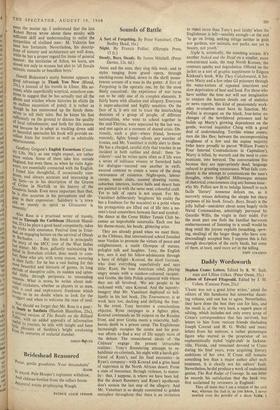Sounds of Battle
ARMS and the man, they sing this week; and in styles ranging from grand opera, through smoking-room ballad, down to the shrill mono- tonous scream of a man in the gutter. A Sort of Forgetting is the operatic one, by far the most finely conceived : the experience of war turns out to be only one of its complex elements. It fairly hums with allusion and allegory. Everyone is super-educated and highly sensitive. On the face of it, it sets out to trace the interlocking destinies of a group of people, of different nationalities, who went to school together in the mid-Thirties, were separated by the last war, and met again at a moment of shared crisis. Ob- viously, such a plot—where friend, however remotely, fights friend—allows any number of ironies, and Mr. Vansittart is richly alert to these. He has a charged, careful style that touches in an incident in both outline and detail: these 'in- cidents'—and he writes quite often as if life were a series of tableaux vivants or furnished halts for dialogue—succeed one another in swift, assured contrast to create a sense of the deep variousness of existence. Night-spots, labour camps, tennis clubs, scented drawing rooms, suburban interiors, lecture halls and desert huts are painted in with the same neat, colourful craft. Yet to talk of opera is not unjust. For Mr. Vansittart deliberately `heightens' his reality (he has a fondness for the macabre) to a point where his protagonists are lifted out of life into a no- man's-land somewhere between fact and symbol : the dance at the Come Hither Tennis Club be- comes an improbable saturnalia. Each one has his theme-music, his heady, glittering arias.
They are already grand when we meet them, at the Château, that international school founded near Verdun to promote the virtues of peace and enlightenment, a sunlit Olympus of statues, polyglot talk and laughter. Tony, the English boy, sees it and his fellow-adolescents through a haze of delight—Konrad, the aloof German, who does everything superlatively and says little; Ryan, the lone American rebel, playing -angry tennis with a rainbow-coloured racquet; and Gretta, the little Polish aristocrat with whom they are all involved. 'We are people to be reckoned with,' says Konrad. And the tapestry- imagery that Mr. Vansittart deployed so bril- liantly in his last book, The Tournament, is at work here too, decking and deifying the four.' In the event, Tony becomes a conscientious objector, Ryan rampages as a fighter pilot, Konrad commands an SS outpost on the Russian front, and poor Gretta meets a miserable, half- heroic death in a prison camp. The Englishman increasingly occupies the centre and his post- war efforts to find a way of life supply most of the debate. The remembered ideals of 'the Château' engage the present intractable realities : Tony's floundering attempts to re- habilitate ex-criminals, his night with a harsh girl- friend of Ryan's, and his final encounter—in Ryan's company—with Konrad and a grim band of supermen in the North African desert. From a state of innocence, through violence, to matur- ity: that, I suppose, is where we have been led. But the desert flummery and Ryan's apotheosis don't sustain the last step of the allegory. And Mr. Vansittart is so deeply committed to golden metaphor throughout that there is an invitation to reject more than Tony's past falsity–when the 1' Englishman is left—sensibly enough—at the end `to go on living, seeking refuge neither in gods nor gardens, nor animals, nor parks, nor yet in beauty, nor youth.'
Night is, artistically, the numbing scream. It's another Naked and the Dead on a smaller, more concentrated scale, the map North Korean, the contours apathy and degradation. Offered on the jacket as a sort of graphic supplement to Engene Kinkead's book, Why They Collaborated, it fol- lows Marty and a few other GI prisoners through the water-torture of repeated interviews and slow deprivation of heat and food. For those who have neither the time nor will nor imagination to conjure the human details out of statistics or news reports, this kind of passionately work- aday re-creation must have its function. Mr. Pollini is strongest on the blank, four-letter ex- changes of the bewildered prisoners and he builds up Marty's growing dependence on the gentle, worried inquisitor Ching with a good deal of understanding. Terrible winter comes; men die like flies; between the uncompromising toughness of a few and the supine majority (who learn proudly to parrot 'William Foster's Four Internal Contradictions in Capitalism'), Marty is lulled, by warmth and the need to com- municate, into betrayal. The conversations live because they are appropriately dead, language reduced to grunting reassurance. What fails com- pletely is the attempt to communicate the men's thoughts, where frightful Milleresque streams of rhetorical consciousness clog any human issue : why Mr. Pollini saw fit to indulge himself in such facile 'literary' nonsense defeats me, as it narrowly misses defeating the simple but sharp purposes of his book. Steady, Boys, Steady is the jolly ballad—anecdotes about some hugely virile Naval Commandoes, admiringly purveyed by Geordie Willis, the virgin in their midst. For the most part one feels the familiar bar-room embarrassment of listening to a small would-be thug retail the joyous exploits (smashing, spew- ing, stealing) of the larger thugs who have con- descendingly accepted him. I suppose this is fair enough description of the early bards, but some of them, at least, used more art in the telling.
JOHN COLEMAN


































 Previous page
Previous page